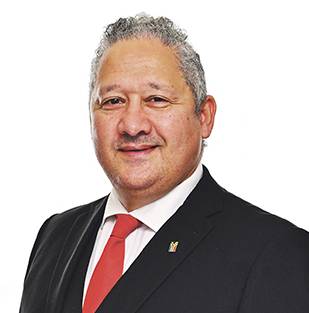Lee Callakoppen, principal officer of Bonitas Medical Fund.
Healthcare cover is a very personal choice
Despite this country having a plethora of medical aid and health insurance products on the market, well over 80% of the population still has no form of medical cover and is absolutely dependent on the public health system. This is not surprising considering that South Africa’s unemployment is the highest in the world, with 32% of employable people without jobs and joblessness a problem compounding every year. Medical aid is a luxury item, and even those who can afford it view it as a grudge purchase.
New medical policy and insurance offerings are constantly being developed – all claiming affordability and health security.
There can be some confusion around medical aid hospital plans and hospital insurance. Hospital insurance may be cheaper in terms of the monthly contribution than medical aid hospital plans, but it is most definitely not the same product offerings provided by medical aids and regulated and overseen by the Council of Medical Schemes (CMS). Hospital or medical insurance includes health insurance, hospital cash back plans and gap cover. Hospital insurance is not part of a medical aid and is governed by the Financial Services Board (FSB).
“We believe hospital insurance should be complementary to medical aid, not a substitute,” says Lee Callakoppen, principal officer of Bonitas Medical Fund. “Gap cover is an additional insurance cover that complements medical schemes. It helps to pay the difference in cost between the amount the specialist or hospital charges and the amount paid by a hospital or medical plan. You will be required to co-pay any shortfalls, after which you may claim from your gap cover, but gap cover can only be used if you are on a medical aid.”
Essentially it is about who needs what kind of cover, when; considering such aspects as pre-existing conditions, life stages such as single or with dependents and degree of disposable income. Those searching for the most appropriate cover need to consider what will be covered, whether premiums will remain affordable, what schemes will help members to handle life’s knocks keep policies going and cover waiting times. Having medical aid and medical insurance running concurrently is perfectly legal.
Proactive member management
 Boitumelo Ndembe, Keyhealth’s clinical specialist.
Boitumelo Ndembe, Keyhealth’s clinical specialist.
Medical cover companies, like Keyhealth Medical Scheme and Bonitas, have both come up with innovative healthcare options, which keep them competitive in this market. Both have plans at different levels of cost and offering different levels of cover, but both have also embarked on a more proactive approach for their members, with managed care benefits.
Bonitas has recognised that over the years the prevalence of non-communicable diseases, such as diabetes and hypertension, has increased year-on-year – further compounded by the increased burden of mental health, which is an added risk factor.
“One of the key insights we have noted is that mental health prevalence is at an all-time high,” says Callakoppen. “This is exacerbated by factors such as an increased economic burden and increased psycho-social challenges, such as load shedding.
“We have seen a 25% increase in the number of mental health hospital admissions, indicating a need for additional support. This need is particularly high in the 18 to 44 age groups. We further noted that mental health was a key driver for absenteeism in corporate groups.
“For this reason, we have included the Bonitas Mental Healthcare Programme across all plans for 2024 and included depression as a chronic condition. We also offer access to Panda, a digital platform available through the Bonitas app, giving members easy access to expert help, mental health information and community support.”
Being hospitalised can also be a contributing factor to poor mental health and Keyhealth has introduced its hospital@home option. The company consistently monitors its high-risk members, specifically those with chronic conditions, and if there is any negative change in a person’s condition, instead of the person going in and out of hospital over a period of days, an intervention can be made if the environment is suitable and a ‘hospital’ set up at the person’s home, where there is 24-hour monitoring and visits by doctors, nurses and therapists.
“This also means that a patient is not exposed to potential hospital complications,” explains Boitumelo Ndembe, Keyhealth’s clinical specialist. “Our cover also extends into palliative care.”
Both medical aids have partners with walk-in and virtual platforms for their members. Technology is a core component to help their members and they invest heavily in apps and constant improvements.
Their research has identified various healthcare trends and needs and thus both are ensuring these are met by adjusting their respective plan benefits and enhancements as they move into 2024.
“Our new members are 13 years younger than the average, which means we have succeeded in attracting a younger, healthier profile,” says Callakoppen. “We attribute this to offering a diversified product range from hospital plans to network options and Edge plans – the latter aimed at new entrants to the workplace, economically active singles or couples, aged between 18 and 35 and driven by technology and ease of access through virtual integration and digital interventions.”
Posed the question of whether they had limitations in terms of choice of service providers, Callakoppen replied: “In South Africa, healthcare providers are free to charge patients any tariff they see fit. However, with the economic pressures faced by consumers, funding is usually in short supply.
“Through engagement and collaboration, we have implemented partner networks at the most favourable tariffs for our members so that they can avoid out-of-pocket expenses and get more value from their medical aid. This applies to GPs, medication, dentistry, optical, specialists and hospitals and the discounted tariffs can reduce or eliminate co-payments.”
Flexibility promoting choice
“We don’t believe in the notion of dictating a service provider, because this deters the patient from seeking care,” says André Young, chairman of Keyhealth Medical Scheme. “If a scheme doctor is unavailable for a consultation, patients still need to be able to seek treatment as soon as possible, otherwise this drives up the number of emergency room consultations.
 André Young, chairman of Keyhealth Medical Scheme.
André Young, chairman of Keyhealth Medical Scheme.
“We are only fairly specific on hospital service providers, however, we are still flexible because we appreciate that certain hospitals are not necessarily accessible in different regions, so members still have choice. Where a specialist hospital is required and our network cannot provide such services, this option is also covered.”
Both companies have increased emphasis on preventative screening, care and monitoring, including wellness checks and health risks assessments. They have also enhanced their different plans for cover for family dependents, such as including the cover of newborns and increasing child-dependant ages.
“We’ve also taken great care to expand our preventative care benefits like including the Human Papilloma (HPV) vaccine on all plans to help prevent cervical cancers,” says Callakoppen.
Virtual healthcare
“Our strategic focus is to enable and advance primary access to healthcare, promoting well-managed, holistic healthcare to encourage healthier patients,” continues Keyhealth’s Ndembe. “For those members with chronic conditions, these need to be managed to ensure that they are compliant to medication and other health regimens. Through members using our virtual healthcare platform, we have access to detection of chronic condition changes and can then put interventions in place.
“We believe in active disease management and through collecting biometric data from patients with chronic conditions, we can ascertain if the patient is on the correct treatment or uncompliant with a treatment. This helps us to engage with the diagnosing doctor, hospitalise and stabilise the patient or consider alternative treatments – and this is not an additional cost.
“We are seeing an increase in cancer, with younger people being diagnosed and this makes it important that benefits are structured to allow for sufficient pre-screening. Partnering up with innovators and innovations in primary healthcare means we can catch conditions earlier, which makes them easier to manage.”
 Patrick Masobe, CEO of Keyhealth.
Patrick Masobe, CEO of Keyhealth.
Patrick Masobe, Keyhealth’s CEO, says affordability plays a major role in choice of cover: “Healthcare is expensive and can drive the decision around paying tens of thousands out of pocket or having to seek treatment at a public health facility. We try and stay as adaptive as possible so that our members have the best possible care that they can afford.”
“Health and wealth go hand in hand. We appreciate that many of our members, and South Africans in general, are faced with increasing financial pressures. We have taken great care to balance our benefit enhancements and package options to provide quality healthcare to our members, while still ensuring that contributions remain affordable,” concludes Callakoppen.
For more details, visit Bonitas Medical Aid or Keyhealth Medical Scheme.